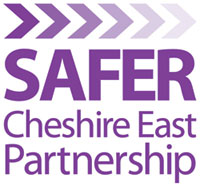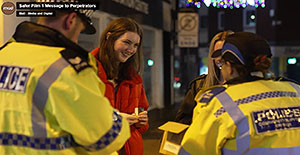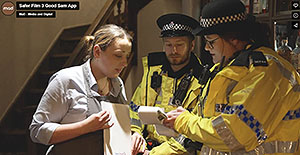Safer Cheshire East Partnership ( SCEP )

Community Safety Partnerships are a statutory requirement under the Crime and Disorder Act 1998. The Safer Cheshire East Partnership (SCEP) brings partners together including Cheshire East Council, Police, Cheshire Fire and Rescue Service, Probation Services, Police and Crime Commissioner (PCC), Health and the Voluntary Sector to provide strategic leadership to reduce crime and provide reassurance to communities that Cheshire East is a safe place to live and work.
The Safer Cheshire East Partnership includes:
SCEP priorities
SCEP meetings take place quarterly and partners work collaboratively to plan on how best to tackle issues of Community Safety. Data and information provided by key agencies produces a 3 Year Strategic Intelligence Assessment (SIA) which is reviewed annually to ensure a focus is provided on the priorities identified across the borough and resources are appropriately allocated to impact on outcomes ensuring Cheshire East is a safer place to live and work.
Partnership Plan
Following the Strategic Intelligence Assessment for 2025-2028, the following Community Safety priorities were identified to form the SCEP Partnership Plan:
- Cybercrime
- Serious Violence - (including Violence Against Women and Girls – VAWG)
- Domestic Abuse – (including Coercive and Controlling behaviour)
- Sexual Offences - (including Child Sexual Abuse)
- Substance Misuse
- Serious and Organised Crime and the manipulation and exploitation of vulnerable people to gain power and control often for financial gain.
- Examples include:- County Lines gangs and Cuckooing
Further identified issues include
SCEP Annual Report 2024-2025
The Safer Cheshire East Partnership is pleased to provide their Annual Report for 2024-2025 (PDF, 1.2MB) which includes information on the projects and activity delivered against its identified Community Safety priorities.
Serious Violence Duty
Combating Drugs Partnership
The Council is working to support the Governments drugs strategy and has established a Cheshire East Combating Drugs Partnership (CECDP). The partnership includes a wide range of local agencies with a focus to deliver against the national strategy’s priorities to break supply chains, deliver a world class treatment and recovery system and achieve a shift in demand for drugs.
The following report provides information on the functions of the CECDP , the progress made to date and further details of how this work links to the wider Strategy.
Violence Against Women and Girls (VAWG)
Following the tragic murder of Sarah Everard, SCEP addressed ways in which conditions could be improved across the borough for women and girls feeling safe. Working closely with the Police and the Police and Crime Commissioners Office, a multi-agency Action Plan has been established by SCEP partners including work and projects being delivered to address concerns raised by local residents and themes identified in the Cheshire Police Strategy focussed on VIAWG.
Information videos

Message to perpetrators
Supt Jesson of Cheshire Constabulary discussing the consequences for perpetrators who commit violence against women and girls.

Keeping women safe
Supt Jesson of Cheshire Constabulary highlighting the work that is been undertaken to help women and girls keep and feel safe in the community.

Good Sam App
Supt Jesson of Cheshire Constabulary outlining the benefits of the “Good Sam App” that allows officers to have live face to face contact via mobile devices.

Reporting crimes
Supt Jesson of Cheshire Constabulary discussing the importance of the community reporting crimes or incidents to the Police.

Safety bus
Supt Jesson of Cheshire Constabulary promoting the new Safety Buses that are been deployed across Cheshire to offer additional support to those enjoying the night time economy.

Measures in place in bars
Highlighting some of the measures that pubs, clubs and bars are putting into place to create a safer environment.
Domestic Abuse Related Death Reviews
The Victims and Prisoners Act 2024 amends the Domestic Violence, Crime and Victims Act 2004, emphasising the establishment and conduct of domestic abuse-related death reviews (DARDR).
- In this section, “domestic abuse-related death review” means a review of the circumstances of the death of a person which is held —
- (a) where the death has or appears to have, resulted from domestic abuse towards the person within the meaning of the Domestic Abuse Act 2021 and
- (b) to identify the lessons to be learned from the death.
Referrals for a DARDR will be submitted to the Safer Cheshire East Partnership (SCEP) immediately upon identifying a case that may satisfy the criteria. The SCEP is responsible for determining whether the referral satisfies the criteria and commissioning a DARDR. If regarded appropriate, the statutory guidance for reviews will be employed to advance the review
See below a copy of the Executive Summary for the Domestic Homicide Reviews completed by Cheshire East in respect of Pam and Mr and Mrs S.
SCEP works alongside other multi-agency partnerships
SCEP recognise that effective partnership working across other local multi-agency networks and boards is essential. SCEP works with other local strategic partnerships to improve outcomes for communities and make sure that local resources are used efficiently and effectively across Cheshire East. Key partner boards include:
Preventing violent extremism
Radicalisation is defined as the process by which people come to support terrorism and violent extremism and, in some cases, to then participate in terrorist groups.
There is no obvious profile of a person likely to become involved in extremism or a single indicator of when a person might move to adopt violence in support of extremist ideas. The process of radicalisation is different for every individual and can take place over an extended period or within a very short time frame.
Three main areas of concern have been identified for initial attention in developing the awareness and understanding of how to recognise and respond to the increasing threat of children/young people being radicalised.
Increasing understanding of radicalisation and the various forms it might take, thereby enhancing the skills and abilities to recognise signs and indicators amongst all staff working with children and young people; Identifying a range of interventions - universal, targeted and specialist - and the expertise to apply these proportionately and appropriately.
Taking appropriate measures to safeguard the wellbeing of children living with or in direct contact with known extremists. In Cheshire East if you suspected a child to be suffering or likely to suffer significant harm, which includes being radicalised, then a referral should be made in line with child protection procedures and you should contact ChECS.
The leaflets will give you further information and there will be further guidance issued in June/July 2015 in connection with the Government’s Prevent Strategy.
Channel programme
One of the main elements of our Prevent work is a programme called Channel, whereby people who are assessed as being vulnerable to supporting violent extremism are provided with multi-agency support. Channel has been operating successfully in Cheshire for about two years, and covers all forms of extremism.
The support that is offered is tailored for each case, and could consist of help with family problems, mental health support, mentoring, religious support and others. People who are referred to Channel are not criminals; but may be at risk of committing an offence if not supported.
Prevent work includes training staff within partner agencies:
- Education
- Health
- Prison
- Probation
- Youth Offending
- Fire Service
- Police
and key organisations within the private sector to spot people who may be at risk of supporting violent extremism and refer them for support.
Support for organisations and individuals to challenge extremist ideology
Many people and groups want to work actively to change extremist ideology and uphold the values of tolerance, democracy, cohesion, equality, the rule of law and freedom of speech. This is most powerful when it comes from within communities themselves. The Prevent Delivery Plan will identify and encourage community-based activities and projects to help this to happen.
Other useful links for further information on this subject:
Health (Joint Strategic Needs Assessment)
Health and Wellbeing Boards have a duty to produce a Joint Strategic Needs Assessment (JSNA) for their area. The JSNA identifies health and social care needs, how well these are being met and opportunities for improvement to inform decision-making. The JSNA work programme also includes a range of reviews into particular health and wellbeing challenges, and also a range of overview documents.
The health of the population is not just determined by health care services, but is also closely linked to the conditions in which people are born, grow, live, work and age. Taking every opportunity to promote healthier places is vital in improving health and wellbeing. It is also key to addressing the differences of experience in health and wellbeing (health inequalities) seen across Cheshire East and reaching those most at risk of poor health.
Page last reviewed: 13 August 2025
Thank you for your feedback.